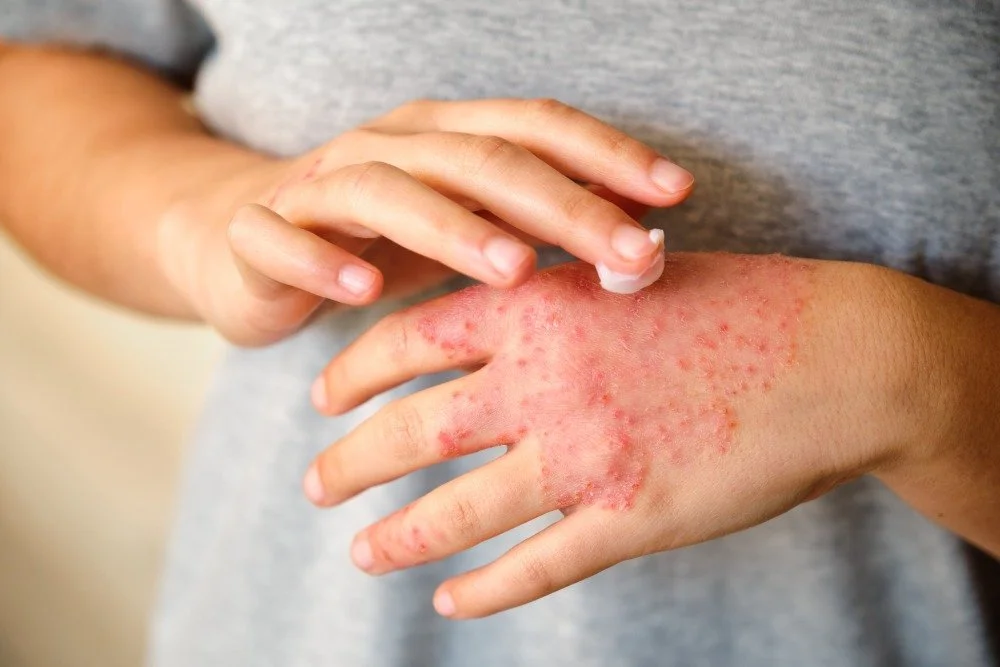Eczema Awareness Month: Managing Fall Flare-Ups with Professional Dermatology Care
October is recognized as Eczema Awareness Month, a time to spotlight one of the most common—and frustrating—skin conditions affecting both children and adults. As temperatures drop and the air becomes drier, many people notice their eczema symptoms intensify. At Summit Dermatology in Medford, OR, our dermatology team specializes in providing effective, personalized solutions that bring relief during flare-up season and beyond.
Why Eczema Gets Worse in the Fall and Winter
Eczema, or atopic dermatitis, often worsens in cooler months because environmental changes place stress on the skin barrier.
Dry Air: Both cold outdoor air and indoor heating systems strip the skin of natural moisture, leading to increased itching and irritation.
Seasonal Allergens: Mold, dust mites, and pet dander rise in fall and winter, triggering flare-ups in sensitive individuals.
Fabric Irritation: Heavier fabrics like wool or synthetics can trap heat and sweat, causing friction and worsening skin inflammation.
Hot Showers: While comforting in chilly weather, long hot showers dehydrate the skin and increase eczema sensitivity.
By recognizing these seasonal triggers, patients can take proactive steps and seek skin treatment before flare-ups escalate.
Professional Treatments for Lasting Eczema Relief
Prescription Creams & Ointments
For moderate eczema, dermatologist-prescribed creams and ointments work more effectively than over-the-counter options. These may include topical corticosteroids, calcineurin inhibitors, or non-steroidal anti-inflammatory agents that reduce itching, redness, and irritation. Our dermatologists also ensure proper use to avoid thinning or overuse side effects.
Biologic Therapies
Patients with severe or resistant eczema often benefit from biologics like dupilumab (Dupixent®), which target specific immune pathways causing inflammation. These injections can dramatically reduce flare-ups, itching, and skin damage. Biologics provide hope for long-term control and improved quality of life, especially when traditional treatments fall short.
Light Therapy (Phototherapy)
Phototherapy exposes eczema-prone skin to controlled doses of ultraviolet light under medical supervision. This treatment reduces inflammation and slows down immune system overactivity that drives eczema symptoms. For patients with widespread or stubborn eczema, phototherapy can be a safe, effective addition to their care plan.
Skincare and Lifestyle Tips for Teens and Adults
Managing eczema requires consistent care outside of the clinic. Our dermatologists recommend:
Daily Moisturizing: Use thick, fragrance-free creams or ointments at least twice a day to lock in hydration and strengthen the skin barrier.
Gentle Cleansing: Choose mild, fragrance-free cleansers and detergents to avoid irritation. Skip harsh scrubs or heavily scented products.
Short, Lukewarm Showers: Limit showers to 10–15 minutes and avoid hot water, which strips natural oils.
Soothing Fabrics: Opt for cotton or bamboo clothing to reduce irritation. Wash new clothes before wearing to remove potential irritants.
Stress Management: Stress is a known eczema trigger. Techniques such as mindfulness, yoga, or exercise may help prevent flare-ups.
Consistency: Even when skin appears clear, continuing your routine prevents future flare-ups and keeps eczema under control.
FAQs About Eczema and Fall Flare-Ups
Q: Is eczema more common in children or adults?
A: Eczema often begins in childhood, with many cases appearing before the age of five. While some children outgrow it, many carry eczema into adulthood or experience flare-ups later in life. At Summit Dermatology, we provide treatment for both pediatric and adult patients, tailoring care to each age group’s needs.
Q: Why does my eczema itch more in the fall and winter?
A: Cool, dry air and heated indoor environments draw moisture out of the skin, weakening its protective barrier. This dryness intensifies itching and irritation, making flare-ups more frequent. Moisturizing consistently and seeking dermatology care can help manage this seasonal pattern.
Q: Can over-the-counter creams treat eczema effectively?
A: Mild eczema may respond to over-the-counter moisturizers, but most cases require prescription-strength treatment for lasting relief. OTC options often lack the anti-inflammatory ingredients necessary to calm the skin and stop flare-ups. If your eczema doesn’t improve after two weeks of OTC care, it’s time to see a dermatologist.
Q: What triggers should I avoid during fall flare-ups?
A: Common triggers include allergens like dust and mold, hot showers, wool clothing, and fragranced soaps or detergents. Emotional stress and sudden temperature changes can also make symptoms worse. Our dermatologists work with you to identify and minimize your personal triggers.
Q: Are biologics safe for long-term eczema management?
A: Yes, biologics like Dupixent® have been shown to be safe and effective for long-term use. They specifically target the immune pathways behind eczema without suppressing the entire immune system. Patients using biologics often report fewer flare-ups, better sleep, and improved skin quality.
Q: When should I see a dermatologist for eczema?
A: If eczema is disrupting sleep, causing pain, spreading rapidly, or not responding to OTC treatments, professional care is essential. Dermatologists can provide stronger medications, advanced therapies, and long-term management strategies. Early intervention also helps prevent complications like skin infections or permanent scarring.
Why Choose Summit Dermatology for Eczema Treatment in Medford, OR
At Summit Dermatology, we believe eczema care should go beyond temporary fixes. Our board-certified dermatologists provide:
Comprehensive treatment plans customized for children, teens, and adults
Advanced therapies including biologics and phototherapy
Expert skincare guidance to improve daily management at home
Compassionate care that prioritizes your comfort and confidence
Eczema is manageable—and with the right care, flare-ups don’t have to control your life.
Take Control This Eczema Awareness Month
Don’t let cooler weather dictate your skin’s health. At Summit Dermatology in Medford, OR, we’re here to help you find lasting relief from eczema through advanced skin treatments and personalized care. Schedule your consultation today and take the first step toward calmer, healthier skin.
🏢 Address: 1910 East Barnett Road, Suite 101, Medford, OR 97504
🕒 Clinic Hours: Monday – Thursday | 7:30 AM – 5:30 PM
📞 Phone: 541-200-2022
📍 Clearer, calmer skin starts with expert care—book your eczema visit today.



